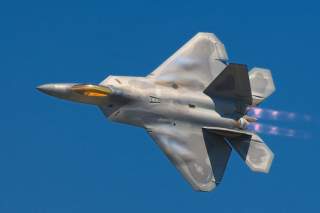Sorry, R2-D2: Computers Aren't Replacing Fighter Pilots
Artificial intelligence hasn't caught up yet.
Score one for the combat geeks, after the news broke this week that a computer defeated a human fighter pilot in a virtual dogfight.
For years, there has been a debate between those who sees drones as the inevitable future of air combat, and those who insist that a human must always be in the cockpit. But the drone crowd received a boost after researchers devised an artificial intelligence, or AI, that bested a human pilot in aerial combat.
Sound too good to be true? The problem with designing a combat AI is that are so many variables to consider in combat, and those variables are so broad that the computer becomes overloaded. So scientists at software firm Psibernetix, the University of Cincinnati and the Air Force Research Laboratory devised ALPHA, an AI that uses “fuzzy logic” to calculate optimum tactics for questions such as which maneuvers to employ and which targets to engage.
ALPHA is currently being used to control virtual UCAVs—the Unmanned Combat Air Vehicles that some believe will eventually replace manned combat aircraft—in AFSIM, the U.S. Air Force computer simulation used to test aerial tactics and weapons. Despite handicaps such as not enjoying AWACS radar plane support, ALPHA handily beat the basic AI in AFSIM.
Considering how bad the AI is in most commercial strategy games, that may be faint praise. But things got interesting when ALPHA was pitted against a retired Air Force colonel and experienced fighter pilot. When the human pilot fought the normal computer-controlled forces in AFSIM, the human won. But when it was human versus the ALPHA AI, “not only could he [the human pilot] not score a kill against it, he was shot out of the air by the reds [computer side] every time after protracted engagements,” according to the researchers, who noted that the pilot “described ALPHA as ‘the most aggressive, responsive, dynamic and credible AI’” he had ever seen.
A fighter jock praising a digital pilot should not be taken lightly. In fact, this development should not be a surprise at all. Computers have steadily become more adept at sophisticated tasks such as beating humans at strategy games, most recently at the game of Go.
Yet before we proclaim R2-D2 the new Red Baron, let's take a deep breath. First, as anyone who has watched Star Trek knows, the advantage that humans enjoy over computers is the ability to think creatively.
But as anyone who has played computer games also knows, games restrict players from thinking too much outside the box. Even if machine beat man, the field of battle was a computer simulation, which raises the question of whether the simulation allowed the human pilot to freely devise tactics without being slapped down for making an illegal move.
Which boils down to a deeper question on the nature of war. Fuzzy logic or not, computers are ultimately constrained by their programming. Yet war, like cooking, is an art rather than a science. Two chefs using identical ingredients will not create identically tasting meals, nor will two commanders on similar battlefields use the exact same tactics. Such inconsistency can be frustrating, hence the endless stream of cookbooks and military manuals that try to regularize behavior so that everyone acts in the appropriate way.
And yet, that same inconsistency is the wellspring of the most remarkable feats. The genius of Napoleon was as much intuitive as logical. Thus the question becomes this: can a dogfight be reduced to a series of logical propositions? If the answer is yes, then an AI can be developed that will defeat a human pilot most of the time. But if inspiration, chance, improvisation and all the other unpredictables of warfare still determine victory, then human warriors are far from obsolete.
Michael Peck is a contributing writer for the National Interest. He can be found on Twitter and Facebook.
Image: F-22A Raptor. Wikimedia Commons/Rob Shenk.

